Are expandable batons legal to carry?
In most states, expandable batons are legal for civilians to buy and carry for non-lethal self-defense use. However, in some states such as California, Washington D.C, Massachusetts, and New York, expandable batons are not legal for civilians.
An expandable baton is a small, heavy metal stick that extends to a certain length and is mainly used by police and law enforcement officers as self-defense equipment. In most states, expandable batons are legal to carry even for civilians.
However, in states such as California, Washington D.C, Massachusetts, and New York, extendable batons are illegal for civilians to own and carry.
Therefore, it is important that you check with your state and local laws and see whether you are permitted to carry an expandable baton whether in your bag or car. You wouldn’t want to be on the wrong side of the law.
What is an Expandable Baton?
If you don’t know what an expandable baton is, you probably know it as a telescopic baton. This type of baton is collapsible on its own. Generally, expandable batons have a length of 16-inches when retracted but they extend to different lengths depending on the specific model. Some of the longest batons can extend above 26-inches.
When on its normal size, the baton is compact for easy concealment. You can hide it inside your bag, under the seat of your car, or in any room in your home where you find it easy to access in an attack situation.
Best Expandable Batons
Here are the best expandable batons on the market
| Baton | Image | Best Price |
| ASP Expandable Batons | 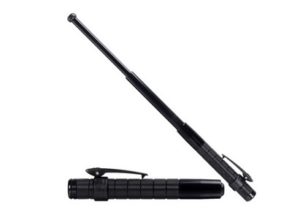 |
Best Price |
| Police Force Expandable Batons | 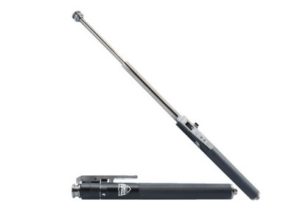 |
Best Price |
| Streetwise Expandable Batons | 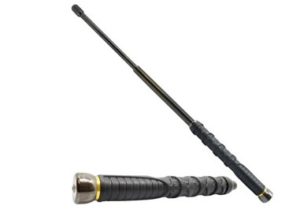 |
Best Price |
| Rothco Expandable Batons | 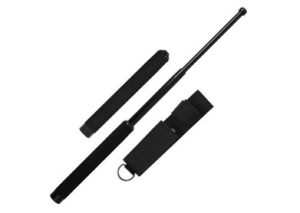 |
Best Price |
| Choice Survival Multifunction Tactical Baton Telescopic Flashlight | 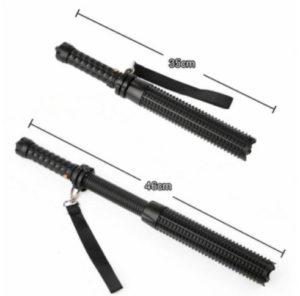 |
|
| Safety Tech Expandable Batons | 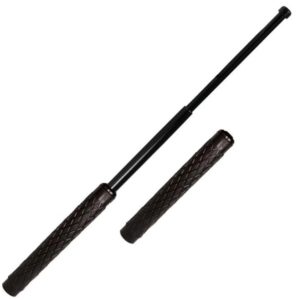 |
Best Price |
| Pepper Spray Batons | 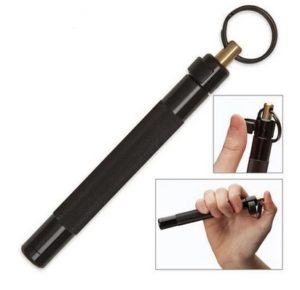 |
Best Price |
| Pink Expandable Batons | 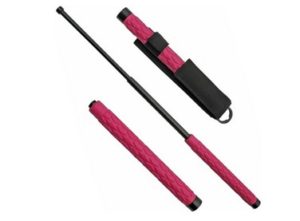 |
Best Price |
| EZ Close Expandable Batons | 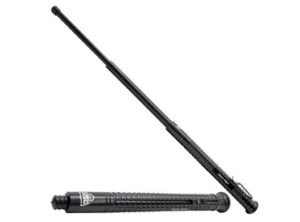 |
Best Price |
How does an Expandable Baton Work?
Any baton depends on a blunt force to inflict pain and injuries to an assailant. You can use it to hit the attacker on any part of their body. However, since batons are less-lethal weapons for self-defense, you should avoid hitting areas such as the neck or back of the head where the skull meets with the spine. You don’t want to inflict permanent damage on a person or cause death.
If you are looking to use an expandable baton as your primary self-defense tool either at home or while you are on the move, here are other important aspects you should know in addition to the legality factor.
Retaining the Baton
One of the primary issues encircling the use of an expandable baton is retention. One of the most natural weapons that human beings use for self-defense is a stick regardless of its kind. It is much simpler and safer to use a stick in a self-defense situation than to use a gun, knife, stun gun, taser, and so on.
You can give a child a stick and they can end up hurting someone or something with it. That said, it’s much easier for an attacker to get the baton from you and use it against you. This is where expandable batons come in handy.
You can easily extend or retract the baton to suit the situation at hand. In an event where the attacker wants to steal the baton from you, you can make it difficult for them by having it in the smallest length possible.
This way, they will have to literally get hold of the grip which is where your hand will be. This should help reduce the chance of them stealing the weapon.
Nevertheless, regardless of whether you are using an extendable baton or just a nightstick, make sure that you always keep retention in mind.
In an event of an attack, it’s best to use your other free hand to keep the attacker away from the grip. If the attacker gets to hold the baton on the other end, you can use a defensive escape maneuver to break the grip.
How to Use a Baton for Self-Defense
Whether you are a civilian or a law enforcement officer, how quickly you defend yourself in an attack can either save your life on not. When carrying an expendable baton, there are multiple ways you can use this valuable tool for self-defense. Let’s take a look.
By Inflicting Pain
When law enforcement officers are in training, they are taught to use batons for crowd control purposes. They should never use a baton to injure or kill. Instead, they use the threat of pain to control people who are either rioting or interfering with people’s peace.
The same thing happens to civilians who carry batons for self-defense. They inflict pain on the person attacking them to defend themselves. If you hit hard on the hands, chest, or any other body part, you will inflict a lot of pain that incapacitates them for a brief period of time. This way, you are able to run to safety.
By Immobilizing the Assailant
In some defensive situations, the attacker can be someone bigger than you by far. This means that pain or the threat of pain might not be enough to deter them from attacking you. Instead, you will need to immobilize them.
To achieve immobilization, you will need to hit them on the bones and hit them as strongly as you can. You should mainly aim for the knee, elbow, or hands as they have less meat or muscle protecting them. Hitting someone hardly with a sturdy piece of metal can easily break their bones.
Lethal Purposes
In an event where it is a matter of life-and-death and you must preserve your life, you might be forced to use the expandable baton as a lethal weapon. In a case like this, you will be required to strike extra-hard and quickly towards the assailant’s head. You should mainly aim for the back of the head, the nose, or the forehead. These areas are more likely to stop the attacker immediately.
If you choose to use your expandable baton for lethal purposes, make sure that you are able to justify your actions clearly that you saw a threat to your life and you had no other way of stopping the attack.
Final Thoughts
Overall, to help answer the question ” Are expandable batons legal to carry? ”, the answer is yes and no. In most states, expandable batons are legal for civilians to buy and carry for non-lethal self-defense use. However, in some states such as California, Massachusetts and New York, expandable batons are not legal for civilians.

